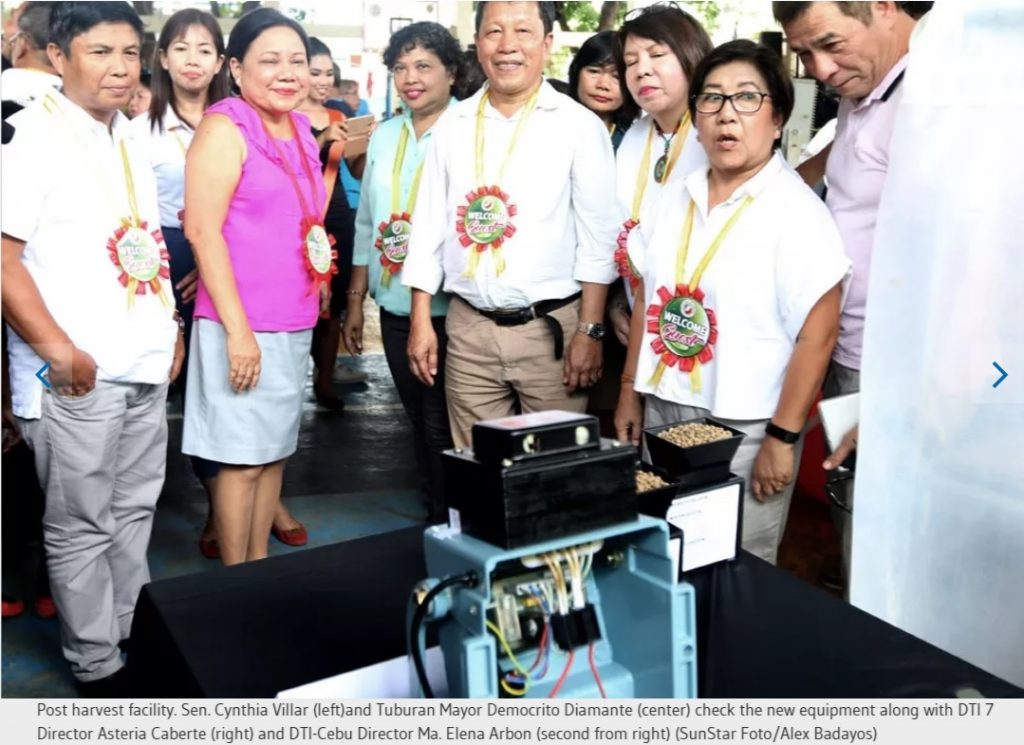written by Katlene Cacho, published by Sun Star Cebu on June 14, 2018
TO boost coffee production in the town of Tuburan, Cebu, the Department of Trade and Industry (DTI) turned over yesterday a shared service post-harvest facility worth P1.1 million.
Sen. Cynthia Villar led the turnover of the equipment, which was endorsed by the DTI to the 252 members of the Kabangkalan Agro-Forestry Farmers Multi-purpose Cooperative (Kafamco). She was in Cebu to lead the oathtaking of newly elected barangay officials of Tuburan.
The shared service facility (SSF) was composed of 10 bean solar driers, three coffee bean moisturizers and sorting table, which are necessary to maintain quality, ensure food safety and reduce losses between harvest and consumption in coffee production.
The coffee farm produced 128.18 kilograms of coffee beans from January to April this year. It generated sales of P102,490.
From a mere 500 hectares in nine barangays in Tuburan, the farm now spans 2,850 hectares in 16 barangays, providing livelihood to about a thousand coffee farmers.

Villar, who is the chair of the committees on agriculture and food, environment and natural resources, and agrarian reform, lauded the post-harvest facility extended to the community, saying this would promote income-generating jobs to farmers, who are among the poorest in society.
She cited inability to access credit and technology as some of the stumbling blocks for farmers and fisherfolk to successfully grow. She also encouraged the farming community to gain more knowledge in agriculture by taking advantage of the skills trainings offered by the government.
Moreover, Villar encouraged Tuburan Mayor Democrito Diamante to intercrop coffee with coconut to increase more yield.
The coffee farm in Tuburan produces the Robusta variety. The farm, according to Diamante, has already been supplying to some hotels and coffee shops in the city.
With the new equipment entrusted to Tuburan, the mayor expects production to grow at least triple in the near term as it seeks to be the leading producer of coffee in the province.

Diamante said part of the initiative is to draft an ordinance that would ensure sustainability of the programs on coffee production.
According to the Philippine Coffee Board (PCB), coffee consumption in the country is rising and is now at 170,000 metric tons (MT) per year from only 75,000 MT in 2002.
However, the country’s production is only 35,000 MT.
Data from the Department of Agriculture (DA) showed that the Philippines imports 75,000 MT to 100,000 MT of dried coffee beans from Vietnam and Indonesia annually at a cost of P7 billion to P10 billion.
Under the Philippine Coffee Roadmap, the country is expected to raise coffee production to 214,626 MT by 2022. This will bring the country’s coffee self-sufficiency level to 161 percent from the current 41.6 percent.
Vietnam is the highest exporter of green coffee beans to the Philippines. Filipinos are also the fifth biggest consumers of coffee behind the EU, the US, Brazil and Japan.
Five government agencies have vowed to collaborate in pushing the implementation of the country’s coffee roadmap—the DTI, DA, Tesda, Department of Agrarian Reform and Department of Environment and Natural Resources.
